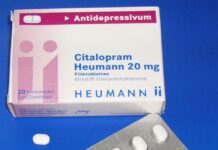Ensuring Integrity of Studies: Analysis of the Dan Markingson Case
Dan Markingson was a 26-year-old mentally ill young man who violently killed himself in 2004 while enrolled in a drug-sponsored study of atypical antipsychotics among persons experiencing psychosis for the first time. Highly vulnerable individuals like Markingson should not be taken advantage of in the name of scientific research, and inability to protect such vulnerable subjects compromises the integrity of research.
On the Link Between Psychiatric Drugs and Violence
One of psychiatry's most obvious vulnerabilities is the fact that various so-called antidepressant drugs induce homicidal and suicidal feelings and actions in some people, especially late adolescents and young adults. This fact is not in dispute, but psychiatry routinely downplays the risk, and insists that the benefits of these drugs outweigh any risks of actual violence that might exist.
New Study Casts Doubt on Efficacy of Ketamine for Depression
A new study, published this month in the Journal of Affective Disorders, investigated the effectiveness of weekly intravenous ketamine injections as a treatment for...
The Story of a Professional Delusion: Do Psychiatrists Believe Their Own Words?
I believe this is what happened: The people responsible for this travesty looked at the truth (that psychiatrists hardly ever tell the truth about their drugs) and realised they didn't like what would flow from that fact getting loose. So they removed it and substituted a falsehood (only ever) whose consequences they could live with.
Researchers Expose Pharmaceutical Industry Misconduct and Corruption
Corruption of pharmaceutical industry sponsored clinical trials identified as a “major obstacle” facing evidence-based medicine.
Rigorous Study Finds Antidepressants Worsen Long-Term Outcomes
A new study conducted by Jeffrey Vittengl at Truman University has found that taking antidepressant medications resulted in more severe depression symptoms after nine years.
Study Finds ADHD Drugs Alter Developing Brain
A new study, published in the JAMA Psychiatry, investigates the effect of stimulant ‘ADHD’ drugs on the brains of children and young adults. The...
Scientists Clarify Risks of Augmenting with Antipsychotic Medications for Depression
The researchers found that while antipsychotic drugs may be slightly more effective than alternative antidepressants, they come with a much higher side effect burden.
Use of Antidepressants Linked to Diabetes
Selective serotonin reuptake inhibitors (such as Prozac and Zoloft) are the most commonly prescribed medication for depression. SSRIs have long been associated with an...
Is Long-term Use of Benzodiazepines a Risk for Cancer?
A large study of the population in Taiwan reveals that long-term use of benzodiazepine drugs, commonly prescribed for anxiety, significantly increases the risk for brain, colorectal, and lung cancers. The research, published open-access in the journal Medicine, also identifies the types of benzodiazepines that carry the greatest cancer risk.
Psychotropic Medications Serve as Powerful Tools for U.S. Military, Imperialism
Ethnographic research sheds light on extensive psychopharmaceutical use by soldiers in post 9/11 U.S. wars.
The ADHD Drug Abuse Crisis on College Campuses
The abuse of ADHD drugs on college campuses has reached epidemic proportions, according to the authors of a recent review in the journal of Ethical Human Psychology and Psychiatry. ADHD drugs, like Ritalin and Adderall, have become so commonplace on college campuses that students abusing these drugs for studying, weight loss and partying have underestimated their risks. As a result, we have seen exponential increases in emergency room visits, overdoses, and suicides by students taking these drugs.
Interview: Researchers Deconstruct Ghostwritten Industry Trial for Antidepressant
Researchers, Jon Jureidini, Jay Amsterdam and Leemon McHenry, have taken a closer look at the data from a randomized control trial of citalopram (Celexa) that was ghostwritten and then used by the manufacturers to support claims of the drug’s efficacy and safety in the treatment of child and adolescent depression. To get the background on this story, we connected with Dr. Leemon McHenry, an investigator in this study and a lecturer in philosophy at California State University, Northridge.
Over 1,000 Antidepressant Users Describe how Their Personal Life has Been Affected
Survey examines adverse personal and interpersonal effects of antidepressants and the impact of polypharmacy
The “Shotgun Method” – A Story of Mental Health Crisis in Iceland
"Let's try the shotgun method," my psychiatrist said — meaning that you load the gun with a bunch of pellets and hope that one of them hits the target. I went through 16 different psychiatric medications in five years, and they were not the right choice for me.
The FDA Is Hiding Reports Linking Psych Drugs to Homicides
In my wildest dreams, I could never have imagined being drawn into a story of intrigue involving my own government’s efforts to hide, from the public, reports of psychiatric drugs associated with cases of murder, including homicides committed by youth on the drugs. But that is precisely the intrigue I now find myself enmeshed in.
Violence Caused by Antidepressants: An Update after Munich
The media is now reporting details about the 18-year-old who shot and killed nine and wounded many others before killing himself on July 22 in Munich. My clinical and forensic experience leads to a distinction among people who murder under the influence of psychiatric drugs. Those who kill only one or two people, or close family members, often have little or no history of mental disturbance and violent tendencies. The drug itself seems like the sole cause of the violent outburst. On the other hand, most of those who commit mass violence while taking psychiatric drugs often have a long history of mental disturbance and sometimes violence. For these people, the mental health system seems to have provoked increasing violence without recognizing the danger.
Poor Evidence and Substantial Bias in Ritalin Studies
The authors of a large scale well-conducted systematic review of methylphenidate, also known as Ritalin, conclude that there is a lack of quality evidence for the drug’s effectiveness. Their research also revealed that Ritalin can cause sleep problems and decreased appetite in children.
Citizens Petition Calls for Sexual Side Effect Warnings
Researchers take action after study exposes enduring sexual dysfunction as a potential side effect of serotonin reuptake inhibiting antidepressants, 5α-reductase inhibitors, and isotretinoin.
Philosophers Challenge Psychiatry and its Search for Mechanisms of Disorder
Attempting to locate the mechanisms of psychiatric disorder is a step in the wrong direction and fails to challenge potentially unjust social practices.
FDA Warns About New Impulse-Control Problems Associated With Abilify
Yesterday, the US Food and Drug Administration (FDA) released a warning that the antipsychotic drug aripiprazole or Abilify is associated with compulsive and uncontrollable...
Review Examines Causes and Consequences of Overdiagnosis in Primary Care
A new review in BMJ investigates overdiagnosis in primary care settings, where the majority of mental health care is provided in the U.S.
Feral Psychiatry: The Case of Garth Daniels
Garth Daniels, a 39-year-old Melbourne man, has been shackled for 110 days and forced to undergo ECT 94 times at three times a week against his will. Last year, his family asked me to provide a second opinion on Garth’s case. As predicted, my recommendations against continued ECT were quickly dismissed by the hospital. There are critically important issues at stake in this case.
Consent and Psychiatry: Problematizing the Problematic
It is rare to get involved in a dialogue over psychiatry without sooner or later someone defending the use of such “treatments” as ECT “as long as they are consented to,” with the term “informed consent” periodically employed. Herein lies the context for this piece. The issue that I want to probe, to be clear, is not whether force should be used—for of course it shouldn’t—but the thorny issue of consent itself—what exactly constitutes consent and what other issues besides consent are critical to factor in when considering what it is and is not legitimate for a “medical” professional to offer.
Madness in Civilisation: A Cultural History of Insanity
Until recently the history of psychiatry was a neglected backwater whose murky depths were explored largely by psychiatrist. The impression conveyed by books such as Tuke’s Chapters in the History of the Insane in the British Isles, Macalpine and Hunter's Three Hundred Years of Psychiatry: 1535 - 1860, Berrios and Freemen's 150 Years of British Psychiatry 1841 - 1991, or Fuller Torrey and Miller's The Invisible Plague, is one that sees psychiatry and modern systems of mental health care as the inevitable outcome of progress through scientific thought, a (white European male-led) narrative from darkness and ignorance to enlightenment and knowledge.























